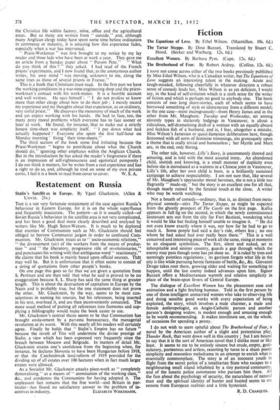Fiction
The Equations of Love. By Ethel Wilson. (Macmillan. 10s. 6d.) Excellent Women. By Barbara Pym. (Cape. 12s. 6d.) The Brotherhood of Fear. By Robert Ardrey. (Collins. 12s. 6d.) I HAVE not come across either of the two books previously published by Miss Ethel Wilson, who is a Canadian writer, but The Equations of Love suggests an interesting talent in the making. Acute and tough-minded, following cheerfully in whatever direction a robust sense of comedy leads her, Miss Wilson is as yet deficient, I would say, in the kind of self-criticism which is a sixth sense for the writer of fiction and which is perhaps no good to anybody else. The book consists of two long short-stories, each of which seems to have borrowed something of style or idiosyncrasy from a different model; in the one case—most incongruously—from Henry James and in the other from Mr. Maugham. Tuesday and Wednesday, set among slovenly types in slatternly lodgings in Vancouver, is about a ridiculous, self-dramatising drab of a woman with an equally absurd and feckless fish of a husband, and is, I fear, altogether a mistake. Miss Wilson's Jamesian or quasi-Jamesian deliberation here, though festooned with all sorts of feminine trimmings, sits grotesquely upon a theme that is really trivial and humourless ; her Myrtle and Mort are, in the end, only tioring.
The other tale, however, Lilly's Story, is uncommonly shrewd and amusing, and is told with the most assured irony. An abandoned child, sluttish and knowing, is a small monster of duplicity even before she is introduced as a waitress in a Chinese joint in Vancouver, Lilly's life, after her own child is born, is a brilliantly sustained campaign to achieve respectability. I am not sure that, like several of Mr. Maugham's spectacular moral heroines, she is not a little too flagrantly " made-up," but the story is an excellent one for all that, though nearly ruined by the farcical touch at the close. A writer who may be worth watching.
Not a breath of comedy—ordinary, that is, as distinct from meta- physical comedy—stirs The Tartar Steppe, as might be expected from the ghostly prospect of The Castle on the first page. Kafka appears in full fig on the second, in which the newly commissioned lieutenant sets out from the city for Fort Bastiani, wondering what it would be like but, finding himself unable to imagine it. " He did not even know exactly where it was, nor how far he had to go to reach it. Some people had said a day's ride, others less ; no one whom he had asked had ever really been there." This is a well conceived and interesting piece of work all the same, rising at moments to an eloquent symbolism. The fort, silent and naked, set in inhospitable and sinister country, guards a gap through which the enemy may pass though none has yet done so. It is ruled by iron and seemingly pointless regulations ; its garrison forgets what life in the city is like while pursuing heroic fantasies of battle, &c., &c. Giovanni Drogo takes root there, growing older and waiting for something to happen, until the last enemy indeed advances upon him. Signor Buzzati offers a Mediterranean warmth and relative simplicity in place of the brain-spun fevers of Central Europe.
The dialogue of Excellent Women has the pleasantest ease and animation and a light fetching humour. Told in the first person by one of those intelligent unmarried women who take to observing life and doing sensible good works with every expectation of being exploited, the story, which involves a male charmer, a male and female anthropologist, an Anglo-Catholic parson and another parson's designing widow, is modest enough and amusing enough to be worth recommending. It makes inordinate use, on the whole, of occasions for spending a penny.
I do not wish to seem spiteful about The Brotherhood of Fear, a novel by the American author of a slight and pretentious play, Thunder Rock, that went down well in this country ; but I am bound to say that it is the sort of American novel that I dislike most or like least. It seems to me to be entirely sincere but crude, empty, gesti- culatory, portentous and artless, resorting by turns to a sham poetic simplicity and reasonless melodrama in an attempt to enrich what is essentially commonplace. The story is of an innocent youth in flight from the secret police of a totalitarian State who escapes to a neighbouring small island inhabited by a tiny pastoral community, and of the lunatic police automaton who pursues him there. All the fuss about the psychology of security, the naturalness of natural man and the spiritual identity of hunter and hunted seems to me remote from European realities and a little hysterical.
R. D. CHARQUES.


































 Previous page
Previous page